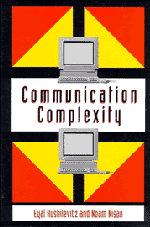Preface
Published online by Cambridge University Press: 05 November 2009
Summary
This book surveys the mathematical field of communication complexity. whereas the original motivation for studying this issue comes from computer systems and the operations they perform, the underlying issues can be neatly abstracted mathematically. This is the approach taken here.
Communication
The need for communication arises whenever two or more computers, components, systems, or humans (in general, “parties”) need to jointly perform a task that none of them can perform alone. This may arise, for example, due to the lack of resources of any single party or due to the lack of data available to any single party.
In many cases, the need for communication is explicit: When we search files on a remote computer it is clear that the requests and answers are actually communicated (via electrical wires, optical cables, radio signals, etc.). In other cases, the communication taking place is more implicit: When a single computer runs a program there is some communication between the different parts of the computer, for example, between the CPU and the memory, or even among different parts of the CPU. In yet other cases, there is no real communication going on but it is still a useful abstraction. For a problem whose solution relies on several pieces of data, we can imagine that these pieces of data need to communicate with each other in order to solve the problem; in reality, of course, this communication will be achieved by a processor accessing them all.
Complexity
The notion of complexity is becoming more and more central in many branches of science and in particular in the study of various types of computation.
- Type
- Chapter
- Information
- Communication Complexity , pp. x - xivPublisher: Cambridge University PressPrint publication year: 1996
- 1
- Cited by



